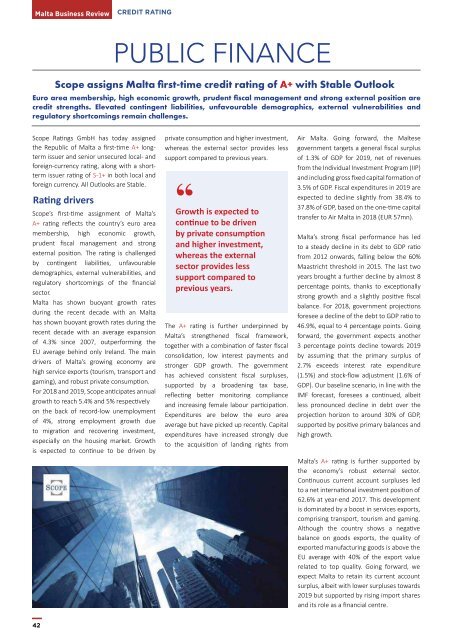MBR_ISSUE 46_NOV_DEC_18_LowRes
You also want an ePaper? Increase the reach of your titles
YUMPU automatically turns print PDFs into web optimized ePapers that Google loves.
Malta Business Review<br />
CREDIT RATING<br />
PUBLIC FINANCE<br />
Scope assigns Malta first-time credit rating of A+ with Stable Outlook<br />
Euro area membership, high economic growth, prudent fiscal management and strong external position are<br />
credit strengths. Elevated contingent liabilities, unfavourable demographics, external vulnerabilities and<br />
regulatory shortcomings remain challenges.<br />
Scope Ratings GmbH has today assigned<br />
the Republic of Malta a first-time A+ longterm<br />
issuer and senior unsecured local- and<br />
foreign-currency rating, along with a shortterm<br />
issuer rating of S-1+ in both local and<br />
foreign currency. All Outlooks are Stable.<br />
Rating drivers<br />
Scope’s first-time assignment of Malta’s<br />
A+ rating reflects the country’s euro area<br />
membership, high economic growth,<br />
prudent fiscal management and strong<br />
external position. The rating is challenged<br />
by contingent liabilities, unfavourable<br />
demographics, external vulnerabilities, and<br />
regulatory shortcomings of the financial<br />
sector.<br />
Malta has shown buoyant growth rates<br />
during the recent decade with an Malta<br />
has shown buoyant growth rates during the<br />
recent decade with an average expansion<br />
of 4.3% since 2007, outperforming the<br />
EU average behind only Ireland. The main<br />
drivers of Malta’s growing economy are<br />
high service exports (tourism, transport and<br />
gaming), and robust private consumption.<br />
For 20<strong>18</strong> and 2019, Scope anticipates annual<br />
growth to reach 5.4% and 5% respectively<br />
on the back of record-low unemployment<br />
of 4%, strong employment growth due<br />
to migration and recovering investment,<br />
especially on the housing market. Growth<br />
is expected to continue to be driven by<br />
private consumption and higher investment,<br />
whereas the external sector provides less<br />
support compared to previous years.<br />
"Growth is expected to<br />
continue to be driven<br />
by private consumption<br />
and higher investment,<br />
whereas the external<br />
sector provides less<br />
support compared to<br />
previous years.<br />
The A+ rating is further underpinned by<br />
Malta’s strengthened fiscal framework,<br />
together with a combination of faster fiscal<br />
consolidation, low interest payments and<br />
stronger GDP growth. The government<br />
has achieved consistent fiscal surpluses,<br />
supported by a broadening tax base,<br />
reflecting better monitoring compliance<br />
and increasing female labour participation.<br />
Expenditures are below the euro area<br />
average but have picked up recently. Capital<br />
expenditures have increased strongly due<br />
to the acquisition of landing rights from<br />
Air Malta. Going forward, the Maltese<br />
government targets a general fiscal surplus<br />
of 1.3% of GDP for 2019, net of revenues<br />
from the Individual Investment Program (IIP)<br />
and including gross fixed capital formation of<br />
3.5% of GDP. Fiscal expenditures in 2019 are<br />
expected to decline slightly from 38.4% to<br />
37.8% of GDP, based on the one-time capital<br />
transfer to Air Malta in 20<strong>18</strong> (EUR 57mn).<br />
Malta’s strong fiscal performance has led<br />
to a steady decline in its debt to GDP ratio<br />
from 2012 onwards, falling below the 60%<br />
Maastricht threshold in 2015. The last two<br />
years brought a further decline by almost 8<br />
percentage points, thanks to exceptionally<br />
strong growth and a slightly positive fiscal<br />
balance. For 20<strong>18</strong>, government projections<br />
foresee a decline of the debt to GDP ratio to<br />
<strong>46</strong>.9%, equal to 4 percentage points. Going<br />
forward, the government expects another<br />
3 percentage points decline towards 2019<br />
by assuming that the primary surplus of<br />
2.7% exceeds interest rate expenditure<br />
(1.5%) and stock-flow adjustment (1.6% of<br />
GDP). Our baseline scenario, in line with the<br />
IMF forecast, foresees a continued, albeit<br />
less pronounced decline in debt over the<br />
projection horizon to around 30% of GDP,<br />
supported by positive primary balances and<br />
high growth.<br />
Malta’s A+ rating is further supported by<br />
the economy’s robust external sector.<br />
Continuous current account surpluses led<br />
to a net international investment position of<br />
62.6% at year-end 2017. This development<br />
is dominated by a boost in services exports,<br />
comprising transport, tourism and gaming.<br />
Although the country shows a negative<br />
balance on goods exports, the quality of<br />
exported manufacturing goods is above the<br />
EU average with 40% of the export value<br />
related to top quality. Going forward, we<br />
expect Malta to retain its current account<br />
surplus, albeit with lower surpluses towards<br />
2019 but supported by rising import shares<br />
and its role as a financial centre.<br />
42
















